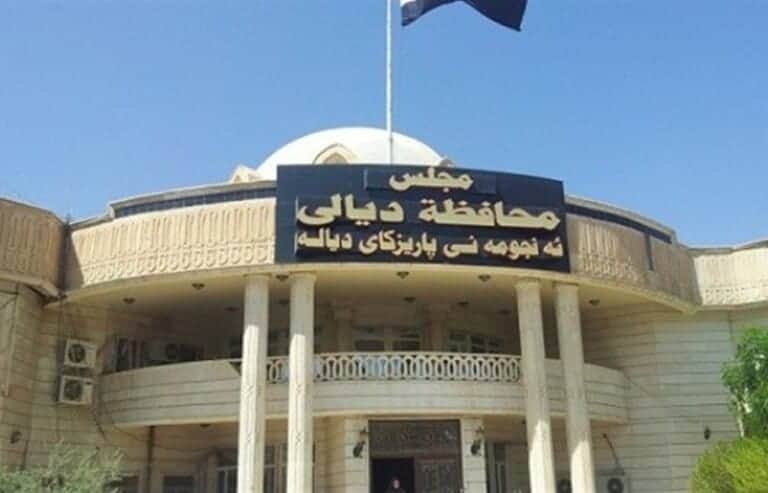Amid the sectarian deadlock in Diyala province, following the Sunni boycott of the provincial council sessions and insistence on selecting the governor from their faction, with the resurgence of violence and chaos directing the province’s course and politics towards governor selection through intimidation, Diyala remains without a government for nearly five months.
With warnings against dragging the province into strife, Diyala council member Aus Al-Muhdawi affirmed today, Wednesday, that political paralysis dominates the provincial council, indicating that there are no solutions to end the province’s conundrum without intervention from Baghdad.
The major conflict in Diyala revolves around the Shia, where Badr, led by Hadi al-Amiri, refuses to relinquish the position, while Maliki sees Diyala as part of his party’s entitlement.
Al-Muhdawi stated in a statement monitored by “Al-Alam Al-Jadeed,” “Social media platforms are preoccupied every hour with news of an imminent session for Diyala council, and there is talk of convergence and agreement, but in reality, there is nothing. Political paralysis reigns supreme amidst increasing complexities on the scene in general.”
He added, “The Sunni and Shia political components, each of them has very complex problems and disputes that increase with time, to the point that reaching an agreement on the identity of a candidate for the governor’s position is almost impossible amidst escalating differences, leading us to the reality that there are 15 candidates for the governor’s position, with each party aspiring to hold the position.”
He pointed out that “ending Diyala’s conundrum requires a central initiative from Baghdad, agreed upon by the main forces to end this issue, which has begun to raise concern among citizens, not to mention its repercussions on service paralysis as local government budgets are about to be released.”
The “Progress,” “Sovereignty,” and “Determination” blocs in Diyala agreed on April 17 not to attend any future sessions of the provincial council unless the governor is from the Sunni component.
This came after several Diyala provincial council members announced on April 15 that they had been threatened by masked gunmen driving around council members’ homes, threatening them with death and arson if they did not vote for a specific party or individual for the governor’s position. However, no council member or other political figures involved in the crisis have disclosed the party that threatened them, while some members of the parliament and the parliamentary security and defense committee called on the security forces in the province to state their position and take action.
The members who were threatened or who issued statements and positions against the threats include: Diyala Provincial Council member Omar Al-Karawi from the Sovereignty Alliance, and Darya Khairallah from the Basic Alliance. Raad Al-Dhulai of the Determination Alliance also issued a statement against the incident and the threat, in addition to Nahida Al-Dayni stating she was threatened, and Rashida Al-Dayni, another Diyala Provincial Council member from the Sovereignty Alliance, also faced threats. As for the Progress Party, a member of the Diyala Provincial Council, Nafi’ Mazhar Al-Jubouri, also expressed a position days ago, calling for the dissolution of the Diyala Provincial Council.
Coalition leader Nouri al-Maliki officially nominated Mu’ayyad al-Obaidi for the position of Diyala governor on April 6, after failing to pass the previous candidate, Wathiq al-Tamimi.
Informed sources revealed on March 7 last year, a political dispute over the nomination of the Coordination Framework candidate and the State of Law Coalition for the position of Diyala governor, Wathiq al-Tamimi, indicating that the provincial council is still divided into two teams, the first of which consists of 8 members who are against his nomination, and the second of which consists of 7 members in favor of Wathiq al-Tamimi taking the position. There are ongoing negotiations by both teams to gather 9 votes and hold a session to pass the election of the chairman of the provincial council and the governor.
Within the 30-day period following the local elections, the Coordination Framework secured control over 7 provinces, but the distribution of local governments to Shia parties was not satisfactory to everyone, as the alliance expected to win 11 provinces.
Three cities slipped from the grip of the Coordination Framework and went to the peripheries that remained allied with it at the national level, but future political and electoral calculations had a different opinion. The biggest crisis facing the Coordination Framework is in Diyala province.
The Diyala Provincial Council held its first session on February 5th last year and decided to keep the session open due to its inability to achieve an absolute majority in voting for the council chairman, and to go to a second round and keep the session open as well after its quorum was disrupted due to the withdrawal of some members without completing the vote to choose a council chairman.





